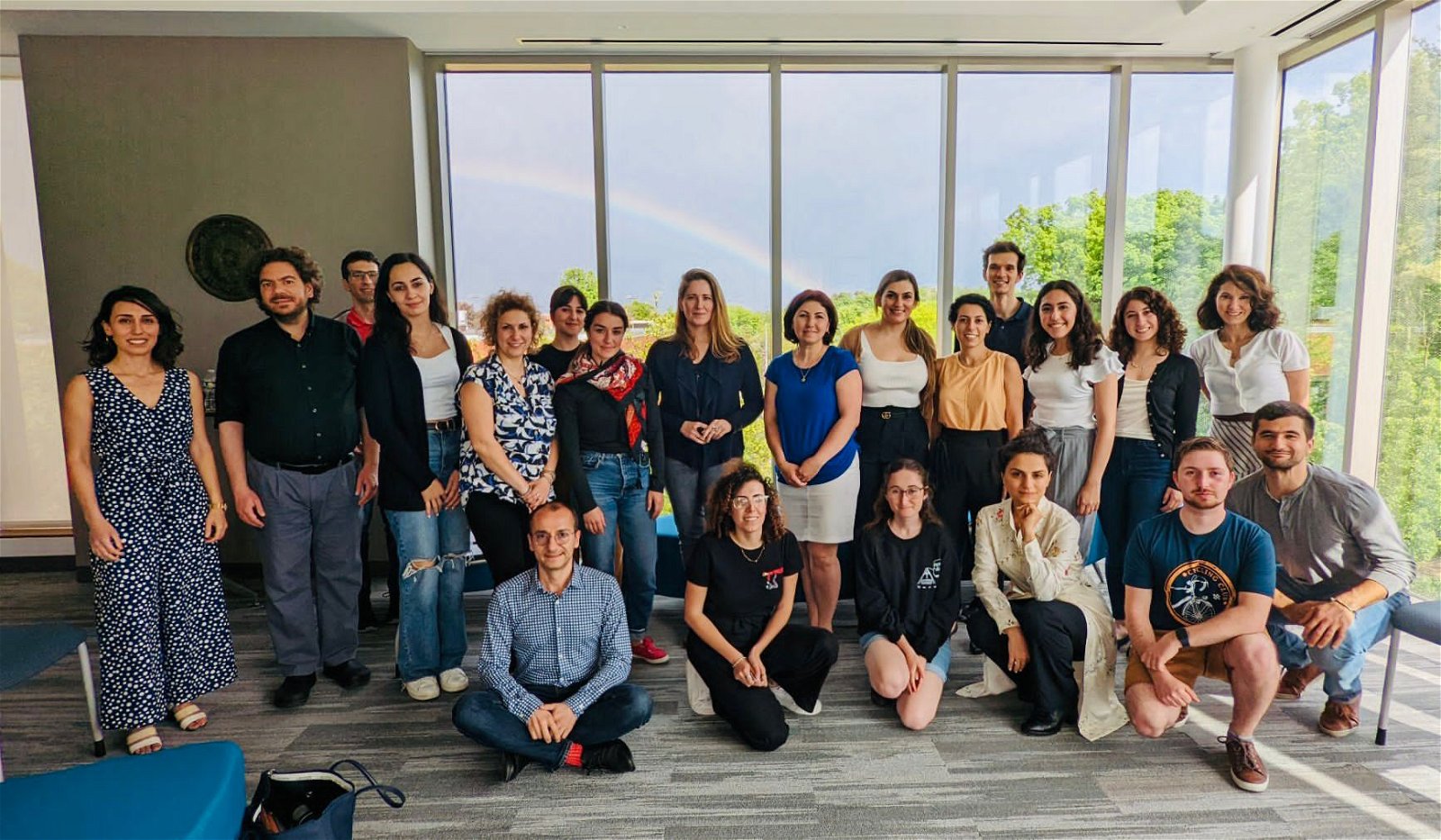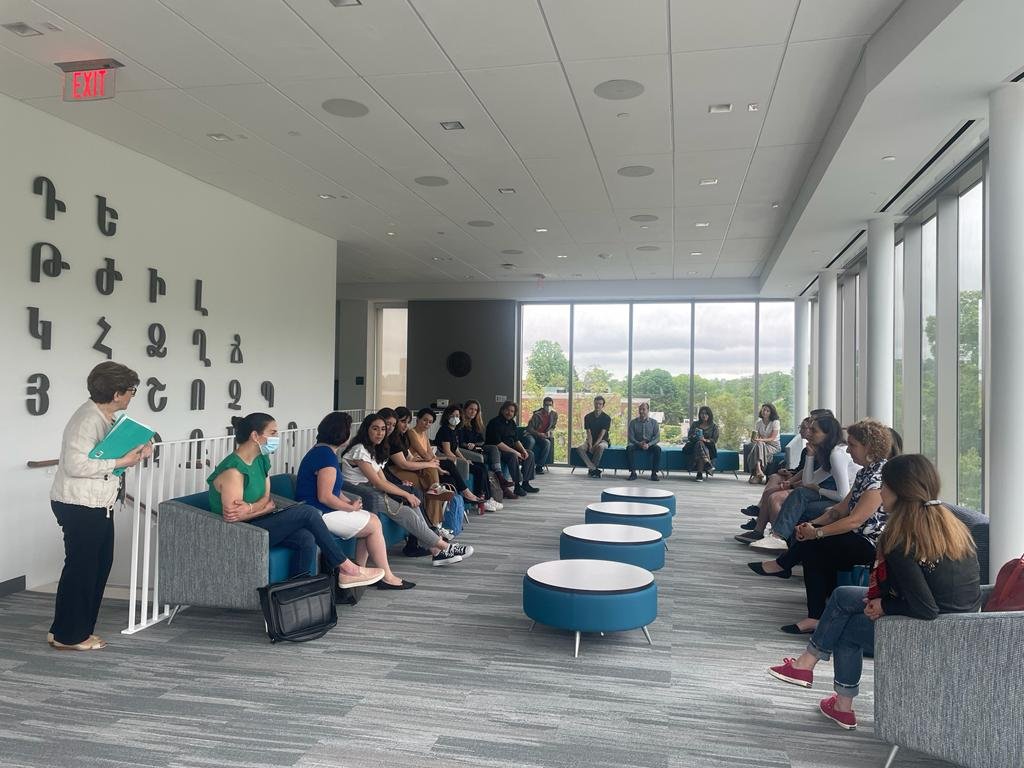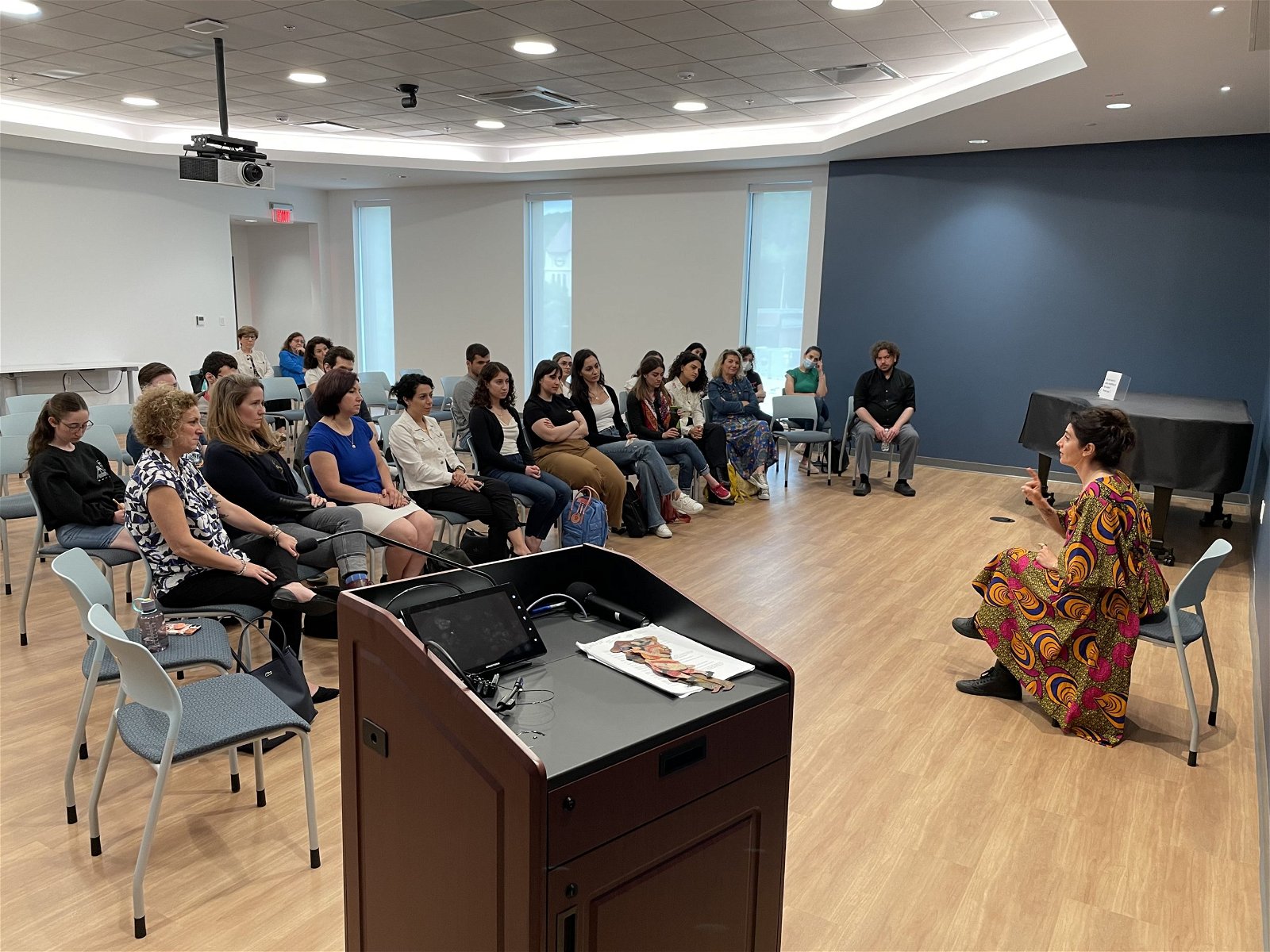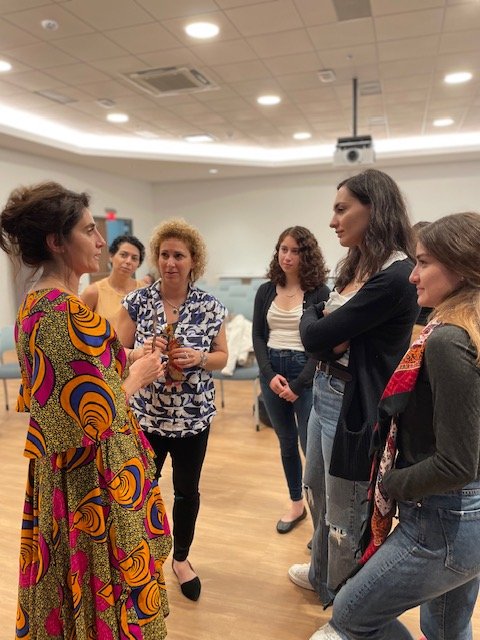
BELMONT, Mass.—A small group of students and young professionals from across the US and Canada immersed themselves in the Armenian language during a cultural retreat organized by the Hamazkayin Eastern Region from May 27 to May 29.
The brand new program held at the NAASR Vartan Gregorian Building over the holiday weekend featured an accomplished and inspiring lineup exploring the theme of storytelling from various perspectives: actor and producer Sona Tatoyan, Dr. Kristi Rendahl, Dr. Lisa Gulesserian and Dr. Khatchig Mouradian, who also served as program director.

The vision for the program and its features were outlined in 2019 through focus groups led by Dr. Mouradian at Columbia University. The program was developed in response to a demand among university students and young professionals for Armenian-language driven outlets fostering creativity and professional development. The retreat aimed to promote an environment where participants can openly discuss, critique and create; where Armenian culture and identity are viewed as dynamic; and where top-down, moralizing approaches give way to horizontal, creative endeavors. The program was made possible through a grant from the Armenian Communities Department of the Calouste Gulbenkian Foundation.

After welcoming remarks from Hamazkayin Eastern Region Executive Committee member Maroush Nigon and Dr. Mouradian, the participants were engrossed in Tatoyan’s impassioned performance of “Azad” before an intimate and captive audience inside the James and Marta Batmasian Hall. The New England setting was quite a departure from the theatrical, multi-sensorial experience at Pico Playhouse last month, but equally powerful nonetheless. From her first utterance of “Karagöz” (an ancient art form) to her cliffhanger on the roads out of Syria, Tatoyan’s stripped-down performance of Azad in Belmont on Saturday morning transported audience members to her family’s home in Aleppo. That’s where she learned how to walk on her first birthday and heard stories about her ancestors’ treacherous journeys toward survival during the Armenian Genocide. It was also where a few years ago she discovered a trunk full of her great-great grandfather Apkar’s multicolored, leather shadow puppets, which Tatoyan says summoned her to this “ferocious calling to the art of storytelling.” As Tatoyan put it, her great-great grandfather “used story to distract from suffering, and he did so with great humor, uplifting our humanity in a time of epic inhumanity.”

Following her rousing performance, Tatoyan welcomed questions from participants, who began discussions surrounding inherited trauma, victimization, art and family histories. Karnie Dishoyan, who was born and raised in Aleppo and moved to the US in 2016, unraveled into tears when she shared with Tatoyan her emotional return to her home country last summer. Teni Apelian of the a cappella trio Zulal recalled the poignant moment in her candid remarks about vulnerability. “Through the tears, you greeted each other with, ‘I’m happy [to meet you]. As Armenians, if we can be this authentic with each other, I think we can heal each other,” said Apelian.
After a lunch break, Dr. Gulesserian arrived to present a brief lesson and workshop on the art of the zine—miniature, eight-page magazines with infinite possibilities for informative, entertaining or inspirational content. Participants referred to examples provided by Dr. Gulesserian’s students at Harvard University and then tapped into their creativity to plan, design and create their own zines in the Armenian language. The zines produced by participants at the cultural retreat offered tips on environmentally sustainable habits, mathematics study skills, mindfulness, quantum mechanics and a touching tribute to family caregivers written and illustrated by Dr. Rendahl, who was the final presenter of the day.
The group moved to the solarium just as the afternoon rain storm was settling down for Dr. Rendahl’s discussion “Navigating times of disruption through language.” Dr. Rendahl, who is fluent in Eastern Armenian, opened up about her time as a volunteer in the Peace Corps, living in the Armenian provinces of Kotayk and Lori from 1997 to 2002. She also discussed some of her post-conflict work with the Center for Victims of Torture.
Three years ago, Dr. Rendahl took on the most delicate and important responsibility supporting her beloved father in the final years of his life. Dr. Rendahl was a loving and trusted primary caregiver and adopted different language strategies to rebuild communication with her ailing father (i.e. creative adaptation, distracting and redirecting, deconstruction). “Get me the stuff with the billion animals in it,” her father once instructed her. “Probiotics. Yogurt. You want yogurt,” exclaimed Dr. Rendahl. “He didn’t know yogurt, but he was able to say, ‘billion animals in it.’ And I understood him, because we were very close.” When she invited participants to break out into small groups and come up with their own example of deconstructing a simple Armenian word, the miraculous appearance of a stunning rainbow was brought to Dr. Rendahl’s attention, an emotional sight that prompted a memorable group photo with the participants.
In another heartbreaking and thought-provoking testimony, Dr. Rendahl explained her communication in Spanish with her father’s caregiver. “When discussing death and other difficult issues, I spoke in Spanish because I didn’t want my father to hear and understand the conversation,” said Dr. Rendahl. “I wondered what would happen if throughout our daily encounters, we thought about listening as our last sense. And if so, what would we want the recipient of our words to hear?”
For the final discussion session, Dr. Mouradian invited one of the participants in the retreat, Dr. Lalai Manjikian, to join him in a conversation on narratives and agency in the context of war, genocide and refugee crises. Manjikian spoke about various types of discourse surrounding refugees, as well as ethical considerations related to refugees. She discussed how refugees are represented by certain media and political discourses, as well as by public opinion. Some of the language used tends to dehumanize and criminalize refugees. She noted the importance of migrant narratives and how refugee voices are crucial in understanding their everyday life realities.
Manjikian then focused on how refugees within an urban context face a period of “in-betweenness” (both in the spatial and temporal terms). During this period of uncertainty and indefinite waits to obtain formal status, refugees face a number of severe obstacles. As a result, they face social exclusion. However, she underlined, based on examples drawn from qualitative interviews she’s conducted with refugee claimants, that the presence of these individuals cannot simply be ignored. Throughout their everyday lives, they actually manage to carve out their own agency by partaking in social and political activities in the city. By doing so, they establish a sense of belonging and become active members of society, despite not being formally recognized as citizens.
Connecting the discussions throughout the weekend, Dr. Mouradian in turn explored themes of agency, storytelling and the importance of amplifying the voices of targeted groups. Another dynamic discussion ensued on education, curricula, public discourse and identity.


Be the first to comment